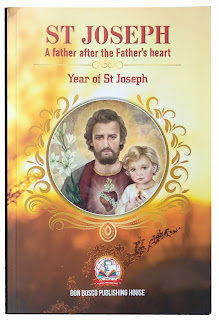Directives for the Celebration of the Liturgy (Book Review)
Directives for the Celebration of the
Liturgy, Conference of Catholic Bishops of India,
CCBI, Bangalore, 2016, ISBN 978-81-930805-3-5, pp. 84, Rs. 150.
The Liturgy is the Source and Summit of the
life and the mission of the Church (Sacrosanctum Concilium, 10). The book under
review starts with these words and I have gone with them too because they are
the raison d’être for this book. India has had a liturgical renewal over the
years but hasn’t yet achieved the goals dreamt for it by the Vatican Council.
Hence, the bishops, who are the chief liturgists of the local Church felt the
need of giving a direction to the ‘celebration of the liturgy so as to enable
all members of the faithful celebrate and live the liturgy to its fullest’. The
book consists of directives that were agreed upon by the Plenary Assembly. They
aim to ensure that the liturgy is celebrated faithfully, devoutly and with due
respect to the sense of the sacred that is characteristic of the Asian spirit.
 The introduction talks about the need for
liturgical norms and points to their source. It then goes on to give directives
for everything connected to the liturgy right from the Liturgical space or Place
of prayer to the manner of celebrating the Liturgical Year. Everything in
between is also given its fair share of attention. The general pattern found
throughout the book is a combination of the theoretical aspect with the
practical implications. This is what makes this book a handy guide. It is a
wonderful and concise reference book for anything connected to the liturgy. It
has 13 chapters and the 14th chapter is the concluding one. For
seminarians who have studied liturgy, the book refreshes our knowledge while
also perhaps enlightening us a few modern influences, like the use of
audio-visuals for example. I was surprised to read about a few directives that
were mentioned as the contrary had been practiced by us in the seminary. So in
quite a few ways the book refreshed and updated my knowledge of liturgy and I’m
sure it will do the same to anyone who reads it. For a layperson it is a simple
and wonderful way of understanding the liturgy and participating in it better.
The introduction talks about the need for
liturgical norms and points to their source. It then goes on to give directives
for everything connected to the liturgy right from the Liturgical space or Place
of prayer to the manner of celebrating the Liturgical Year. Everything in
between is also given its fair share of attention. The general pattern found
throughout the book is a combination of the theoretical aspect with the
practical implications. This is what makes this book a handy guide. It is a
wonderful and concise reference book for anything connected to the liturgy. It
has 13 chapters and the 14th chapter is the concluding one. For
seminarians who have studied liturgy, the book refreshes our knowledge while
also perhaps enlightening us a few modern influences, like the use of
audio-visuals for example. I was surprised to read about a few directives that
were mentioned as the contrary had been practiced by us in the seminary. So in
quite a few ways the book refreshed and updated my knowledge of liturgy and I’m
sure it will do the same to anyone who reads it. For a layperson it is a simple
and wonderful way of understanding the liturgy and participating in it better.
The appendix consists of ‘Do’s and Don’ts
in Liturgy’ which is perhaps something every person, but more specifically
priests and religious ought to keep in mind. I highly recommend this book
particularly for those in formation as it helps set a good and strong
foundation with regard to liturgy and its manner of celebration. I will
conclude with an exhortation to all priests to take this book in hand, read it
again and again till the directives given become a part of your mental
processes. The key person in the liturgical celebration is the priest and it is
imperative that they are aware of what they ought and ought not to do.



Comments
Post a Comment